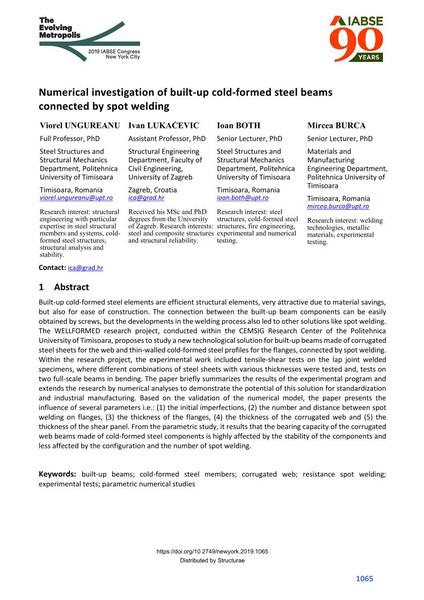Numerical investigation of built-up cold-formed steel beams connected by spot welding

|
|
|||||||||||
Bibliografische Angaben
| Autor(en): |
Viorel Ungureanu
(Steel Structures and Structural Mechanics
Department, Politehnica University of Timisoara)
Ivan Lukačević (Structural Engineering Department, Faculty of Civil Engineering, University of Zagreb) Ioan Both (Steel Structures and Structural Mechanics Department, Politehnica University of Timisoara) Mircea Burca (Materials and Manufacturing Engineering Department, Politehnica University of Timisoara) |
||||
|---|---|---|---|---|---|
| Medium: | Tagungsbeitrag | ||||
| Sprache(n): | Englisch | ||||
| Tagung: | IABSE Congress: The Evolving Metropolis, New York, NY, USA, 4-6 September 2019 | ||||
| Veröffentlicht in: | The Evolving Metropolis | ||||
|
|||||
| Seite(n): | 1065-1070 | ||||
| Anzahl der Seiten (im PDF): | 6 | ||||
| DOI: | 10.2749/newyork.2019.1065 | ||||
| Abstrakt: |
Built-up cold-formed steel elements are efficient structural elements, very attractive due to material savings, but also for ease of construction. The connection between the built-up beam components can be easily obtained by screws, but the developments in the welding process also led to other solutions like spot welding. The WELLFORMED research project, conducted within the CEMSIG Research Center of the Politehnica University of Timisoara, proposes to study a new technological solution for built-up beams made of corrugated steel sheets for the web and thin-walled cold-formed steel profiles for the flanges, connected by spot welding. Within the research project, the experimental work included tensile-shear tests on the lap joint welded specimens, where different combinations of steel sheets with various thicknesses were tested and, tests on two full-scale beams in bending. The paper briefly summarizes the results of the experimental program and extends the research by numerical analyses to demonstrate the potential of this solution for standardization and industrial manufacturing. Based on the validation of the numerical model, the paper presents the influence of several parameters i.e.: (1) the initial imperfections, (2) the number and distance between spot welding on flanges, (3) the thickness of the flanges, (4) the thickness of the corrugated web and (5) the thickness of the shear panel. From the parametric study, it results that the bearing capacity of the corrugated web beams made of cold-formed steel components is highly affected by the stability of the components and less affected by the configuration and the number of spot welding. |
||||
